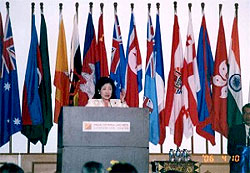As delivered
Policy Speech by H.E. Prof. Akiko Yamanaka
Vice- Minister for Foreign Affairs and the Head of the Delegation of Japan
at the 62nd Session of the United Nations
Economic and Social Commission for Asia and the Pacific (ESCAP)

April 10, 2006
Mr. Chairman,
Mr. Executive Secretary,
Honourable delegates,
Ladies and gentlemen,
It was in 1954 that Japan formally became a member of the ECAFE, which was the predecessor of ESCAP. This admission held great significance for our country, since at that time we had not even been admitted as a Member State of the United Nations. Since then, Japan has benefited from regional cooperation through ESCAP and will continue to make every effort to enhance it.
Economic and social development of the region was severely damaged by the Tsunami disaster last year. Japan was able to start rescue operations immediately utilizing Self-Defense Force ships which were passing the disaster-stricken area. We are proud that we could contribute to tackling the tragedy. Now we are facing another threat in the form of avian influenza. Japan has been tackling this epidemic because we regard it as a common global threat. We successfully hosted the Japan-WHO Joint Meeting on Early Response to Potential Influenza Pandemic last January. Japan also contributed about 155 million US dollars to fight against the threat in the region.
Last September, world leaders reaffirmed at the 2005 World Summit at the United Nations their strong commitment to achieve the Millennium Development Goals (MDGs). Japan intends to continue to endeavour to achieve these goals, especially with regard to the following three aspects.
Firstly, we believe that an interactive linkage between ownership by developing countries and their partnerships with donor countries and international organizations is a key to achieving the MDGs. Japan stresses that human resource development promotes ownership by developing countries. We have supported the developing countries in the region to promote capacity building and education through Official Development Assistance, so called ODA. We also hope that these efforts will help to alleviate unemployment problems in the region.
Secondly, Japan launched a comprehensive "development initiative for trade" in order to promote the empowerment of developing countries through the Doha Round and help them reap the benefits of a multilateral trading system. In this initiative, Japan expresses its commitment to provide duty-free and quota-free market access for imports from LDCs as well as an extensive package of development assistance including assistance of movement to enhance export capability of developing countries.
Thirdly, we place importance on providing assistance to small island countries in achieving the MDGs. We have held the Pacific Islands Leaders Meeting (PALM) since 1997 and extended cooperation to Pacific Island countries in various fields. We will hold the Fourth Summit meeting this coming May in Okinawa, Japan. We hope that the meeting will be successful with the cooperation of all the participating leaders and representatives from the Pacific Islands region.
In order to introduce a guideline with a regional dimension for the attainment of the MDGs, we have submitted to this session of the Commission a draft resolution titled "Implementation of the Millennium Development Goals in Asia and the Pacific." We seek the valuable support of the members of the Commission for our draft resolution.
Mr. Chairman,
Infrastructure development in the region including natural as well as man-made disaster management in the region is important. In order to achieve this goal, it is necessary to mobilize various resources and measures including trade, private investment, human resource development and so on. In the area of policy financing, the Asian Development Bank has played a substantial role, to which Japan has greatly contributed through ODA, recognizing the importance of its activities. We should utilize and possibly strengthen the existing institutions and measures. We take a cautious approach to the idea of establishing a new institution, an Asian Investment Bank, since it apparently duplicates the activities of the ADB. As Head of the Japanese Delegation and an elected member of the House of Representatives, I find it difficult to explain to the voters, or taxpayers of Japan, the need to contribute to two similar financial institutions.
Regarding disaster management, Japan, as a country that has suffered many disasters, has accumulated plenty of useful know-how and experience and announced the "Initiative for Disaster Reduction through ODA" in January to cope with natural as well as man-made disasters. I believe that Japan has the capability to contribute to strengthen regional cooperation in this area.
The United Nations is going through a critical period under management and Secretariat reforms including the mandate review. The role of regional commissions including ESCAP is also being reviewed and sometimes questioned. Against this background, we reiterate the importance for ESCAP to avoid duplication of the functions of other international organizations, to find new raisons d'être, and to be concentrated on areas in which it has comparative advantages. In this context, Japan fully supports the initiative of the Executive Secretary to get a performance evaluation of ESCAP carried out by external experts and is willing to contribute to it.
Ladies and gentlemen,
We have a lot left to do. Let's walk and work together.
I thank you very much. Terima kasih.
Back to Index
